Joint issues like arthritis and hip dysplasia affect millions of dogs, especially as they age, prompting many pet owners to turn to hip and joint supplements for relief. However, not all dog joint supplements are created equal—some can strain delicate kidneys, particularly in dogs with pre-existing sensitivity or chronic kidney disease. If you’re searching for dog joint supplements that don’t harm kidneys, this guide explores safe options backed by veterinary insights and research, helping you support your dog’s mobility without risking renal health.
Choosing kidney-friendly supplements is crucial, as high-phosphorus or protein-heavy formulas can overload the kidneys’ filtering process. We’ll cover why some supplements pose risks, highlight four proven safe choices like green-lipped mussel and CBD oil, and provide a handy safety chart. Always consult your vet before starting any new regimen, especially for senior dogs or those with health concerns.
For broader dietary support in dogs with kidney issues, check out the best diet for dogs with kidney disease.
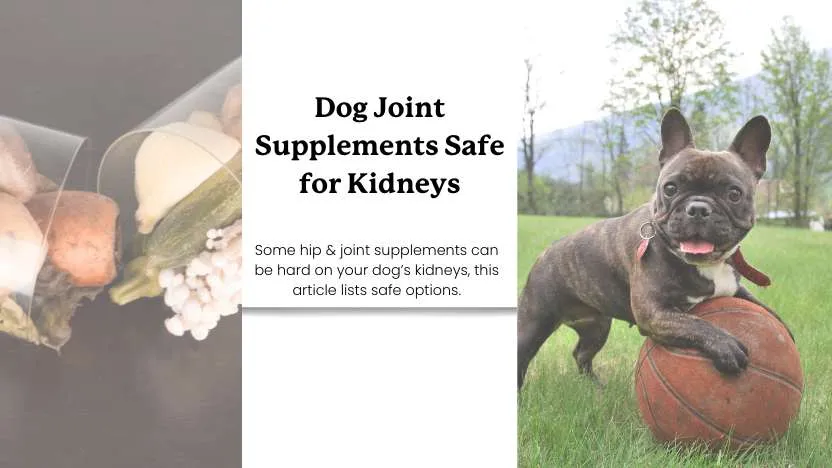 Dog enjoying outdoor play with joint supplement and kidney-safe messaging
Dog enjoying outdoor play with joint supplement and kidney-safe messaging
Why Joint Supplements Can Be Hard on Dog Kidneys
Many popular joint supplements contain ingredients that challenge kidney function. High phosphorus levels, for instance, are common in shellfish-derived glucosamine or bone-based products, forcing kidneys to work overtime to excrete excess minerals. This is especially problematic for dogs with chronic kidney disease (CKD), where phosphorus buildup can accelerate damage.
Excess protein from collagen or meat-heavy chews adds another burden, as kidneys must filter higher nitrogen waste. Salt (sodium) content in flavored treats can raise blood pressure, indirectly stressing renal blood flow. Contaminants like heavy metals in low-quality fish oils or excessive fats that promote oxidative stress further compound risks. Overdosing—common when owners double up for faster results—amplifies these effects, leading to symptoms like increased thirst, lethargy, or urinary changes.
Veterinarians from the American Kennel Club and studies in the Journal of Veterinary Internal Medicine emphasize moderation. Human supplements are a no-go due to differing concentrations and additives. Opting for pet-specific, low-phosphorus formulas minimizes these dangers while delivering joint benefits like reduced inflammation and better mobility.
4 Kidney-Safe Dog Joint Supplements
Most joint supplements are safe at proper doses, but these four stand out for their low renal impact, natural anti-inflammatory properties, and clinical support. They’re ideal for dogs with kidney sensitivity, offering flexibility without the high phosphorus, protein, or salt pitfalls.
1. Green-Lipped Mussel
Green-lipped mussel (GLM), sourced from New Zealand shellfish, is a powerhouse for joint health. Rich in omega-3s (DHA, EPA) and rare ETA fatty acids, it powerfully curbs inflammation—rarer than in typical fish oils. GLM also provides glycosaminoglycans like glucosamine and chondroitin, which lubricate joints and rebuild cartilage.
Why kidney-safe? Low phosphorus and protein make it gentle on kidneys, per veterinary nutritionists. A study in the Journal of Nutrition showed GLM improved mobility in arthritic dogs without renal side effects. Dose by weight: 15-20 mg/kg daily. Start low and monitor; many owners report limber pups within weeks.
Real-world experience: One vet-recommended GLM user saw their 10-year-old Labrador’s limp vanish after a month, with stable kidney values on bloodwork.
2. CBD Oil
Derived from hemp, CBD oil supports joint comfort by modulating the endocannabinoid system, reducing pain perception and inflammation. Research from Cornell University highlights its efficacy for osteoarthritis in dogs, with minimal side effects.
Kidney-friendly profile: Free of phosphorus, protein, or salt burdens, pure CBD is safe even for CKD dogs when dosed correctly (0.1-0.5 mg/kg twice daily). Choose third-party tested, organic products without THC or additives. It pairs well with diets for heart conditions—see wet dog food for heart disease for complementary nutrition.
Owners often note calmer, more active dogs; always vet-check for drug interactions.
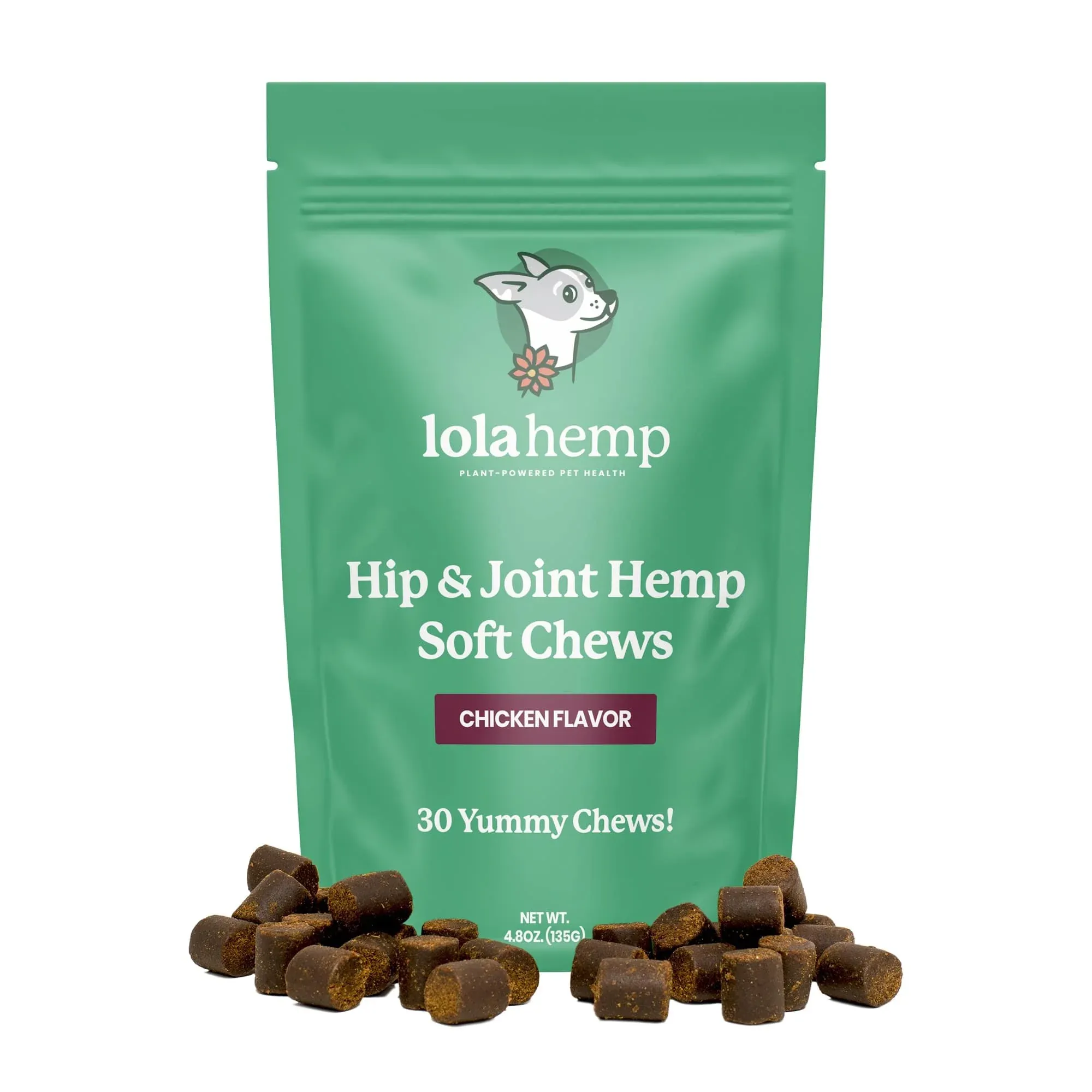 Front of Green colored bag of regular strength lolahemp hip and joint hemp soft chews
Front of Green colored bag of regular strength lolahemp hip and joint hemp soft chews
3. Fish Oil
Omega-3-packed fish oil (EPA/DHA) excels at easing joint stiffness and protecting cartilage in aging dogs. Veterinary trials, including those by the AKC Canine Health Foundation, confirm it reduces inflammation markers without toxicity at moderate levels.
Safe for kidneys: Low phosphorus when pet-formulated and purified of contaminants like mercury. Limit to 100-150 mg EPA/DHA per 10 lbs body weight daily to avoid loose stools or rare high-dose issues. Refrigerate to prevent rancidity, which stresses organs.
Pro tip: Combine with exercise for best results—seniors show marked gait improvements.
4. MSM (Methylsulfonylmethane)
This organic sulfur compound boosts collagen production, easing swelling and supporting ligaments. Often blended with glucosamine, standalone MSM shines for its antioxidant punch.
Renal safety: Ultra-low phosphorus/protein, making it ideal for sensitive dogs. Research in Veterinary Therapeutics notes no kidney strain at 50-100 mg/kg doses. It’s bioavailable and palatable in chews.
Users rave about faster recoveries post-injury, with vets endorsing it for holistic joint care.
For targeted heart-joint overlap, explore hill’s prescription heart care dog food.
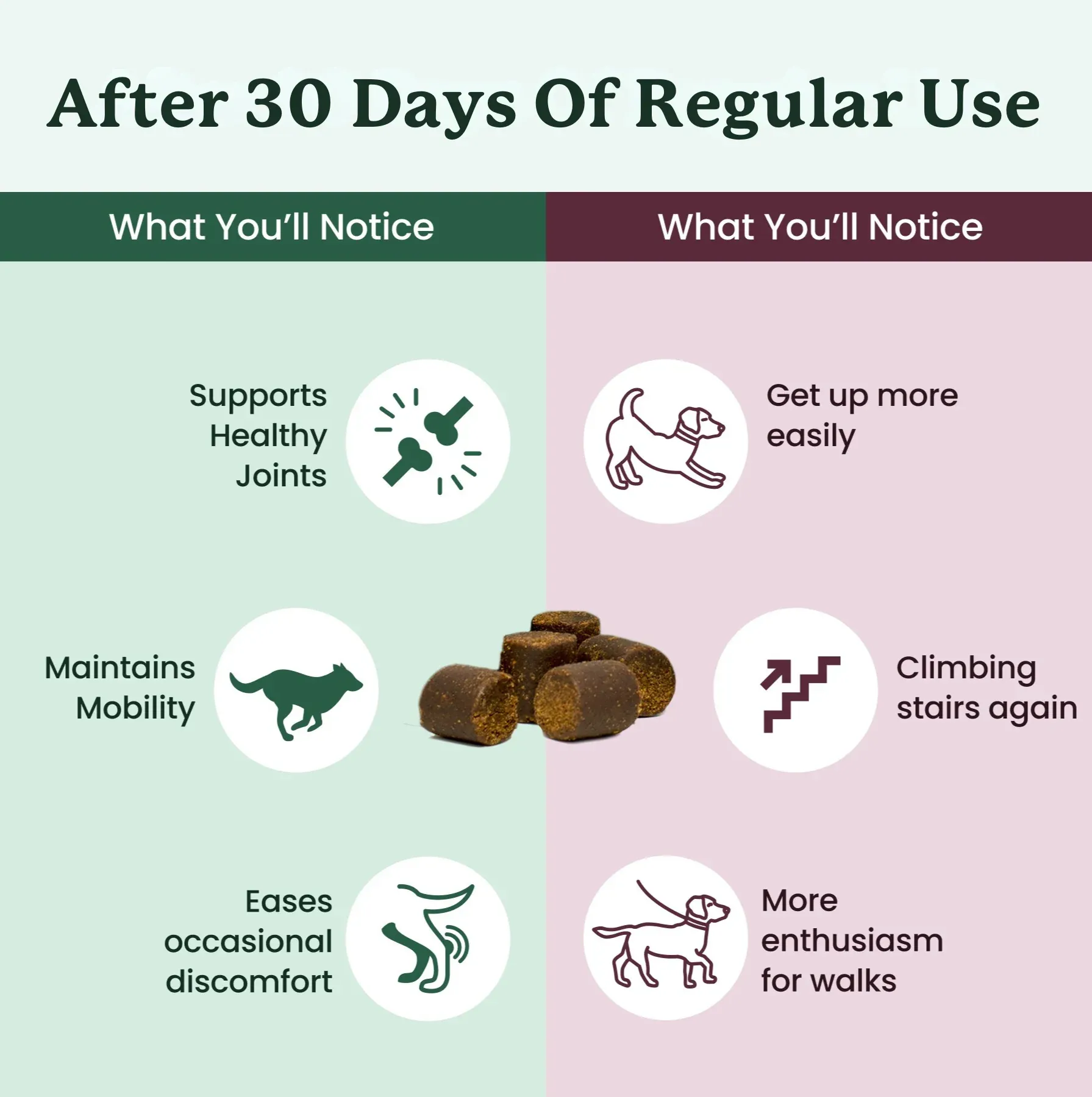 This image describes the benefits of Lolahemp hip & joint chews after 30 days
This image describes the benefits of Lolahemp hip & joint chews after 30 days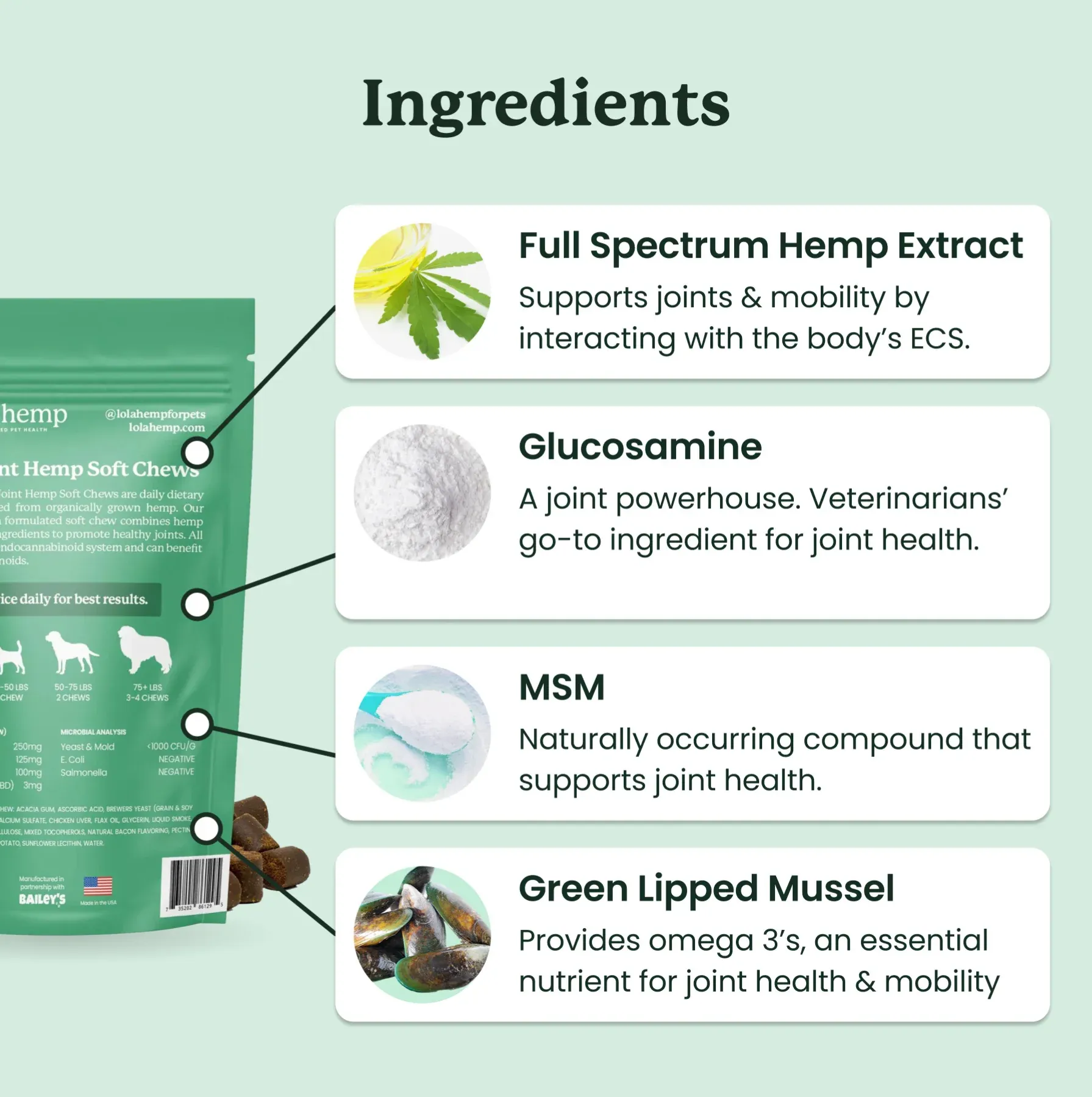 This image lists the ingredients of Lolahemp
This image lists the ingredients of Lolahemp
Joint Supplement Kidney Safety Chart
| Ingredient | Kidney Safety | Recommended for Kidney Disease? |
|---|---|---|
| Glucosamine (High Dose) | Caution; strain at high doses | Vet supervision only |
| Chondroitin Sulfate | Generally safe; monitor combo | Low doses with guidance |
| NSAID Botanicals (Boswellia) | Cautious; liver/kidney stress | Vet approval needed |
| Fish Oil (Moderate) | Beneficial | Yes |
| Turmeric | Mild; monitor sensitivity | With oversight |
| Yucca | Increases workload | Avoid |
| Devil’s Claw | Nephrotoxic potential | Not recommended |
| Green-Lipped Mussel | Low phosphorus; safe | Yes |
| Eggshell Membrane | Low protein/phosphorus | Yes |
| MSM | Very safe | Yes |
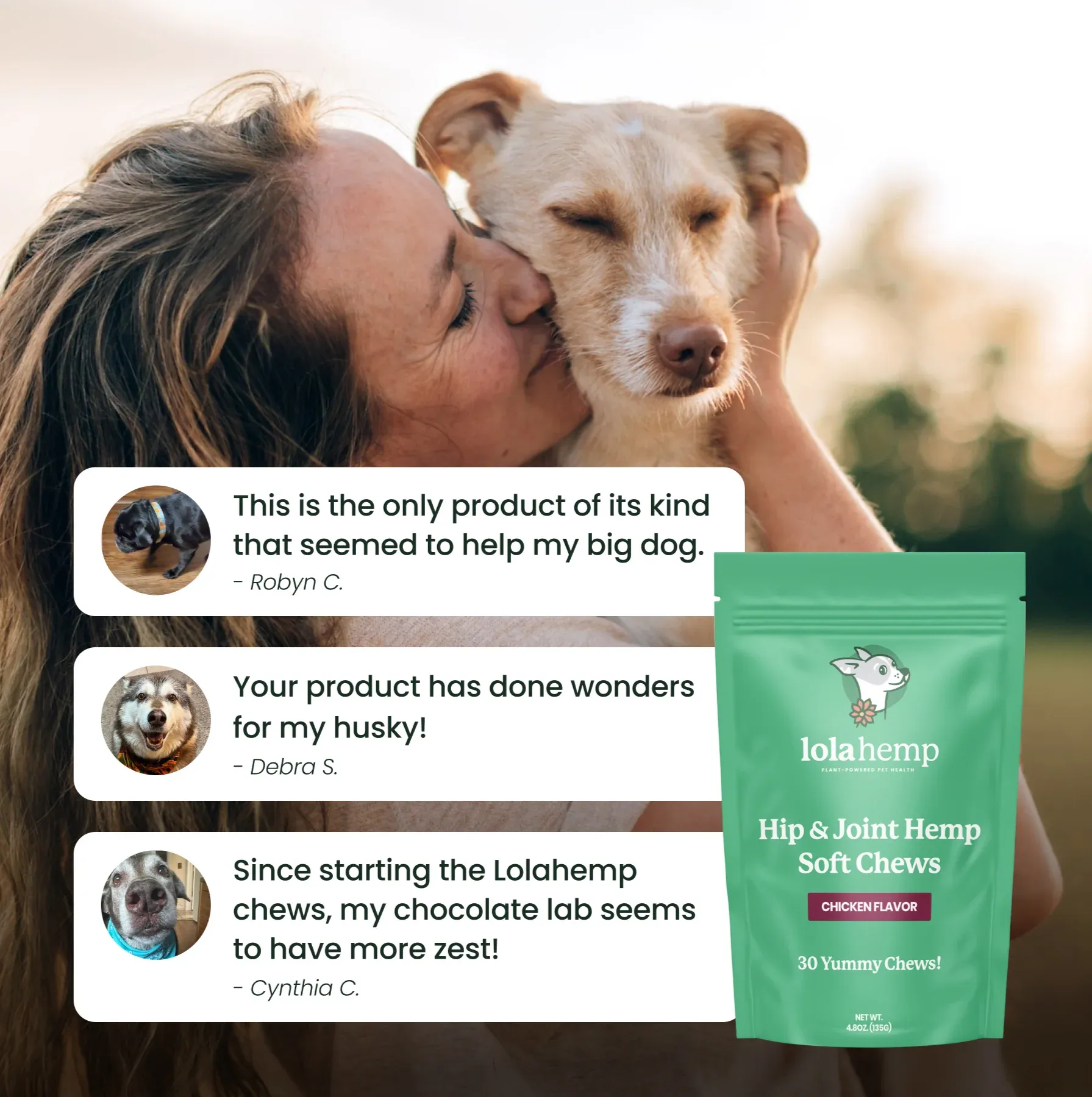 This image lists three real reviews of Lolahemp
This image lists three real reviews of Lolahemp
This chart, informed by veterinary sources like the Merck Veterinary Manual, helps quick-scan options.
Conclusion
Dog joint supplements that don’t harm kidneys like green-lipped mussel, CBD oil, fish oil, and MSM offer real relief for arthritis or dysplasia without renal risks—when dosed properly and vet-approved. Avoid high-phosphorus traps, human products, and overdosing to keep your pup thriving.
Monitor for changes in appetite, water intake, or energy, and pair supplements with weight management and low-impact exercise. Your veterinarian can tailor a plan, potentially including blood tests for peace of mind.
Ready to boost mobility? Explore more on best dog food for dogs with heart disease and consult pros today!
Frequently Asked Questions About Kidney-Safe Joint Supplements for Dogs
Are joint supplements safe for dogs with kidney disease?
Yes, in moderation—kidney-friendly picks like GLM or MSM avoid phosphorus overload. Vet input is essential.
What’s the best joint supplement for dogs with kidney sensitivity?
Green-lipped mussel tops lists for its natural ETA and low renal impact, followed by CBD and fish oil.
Can glucosamine hurt dog kidneys?
Moderate doses are fine, but high/prolonged use may strain—opt for alternatives if CKD is present.
Is fish oil okay for kidney-compromised dogs?
Absolutely, at moderate doses; it aids inflammation without harm, per vet studies.
How do I introduce joint supplements safely?
Start low, one at a time, watch for symptoms, and recheck with bloodwork after 2-4 weeks.
What to avoid in joint supps for kidney dogs?
Yucca, devil’s claw, high-dose botanicals, and salty/high-protein formulas.
For digestive synergy, see hills digestive care dry dog food.
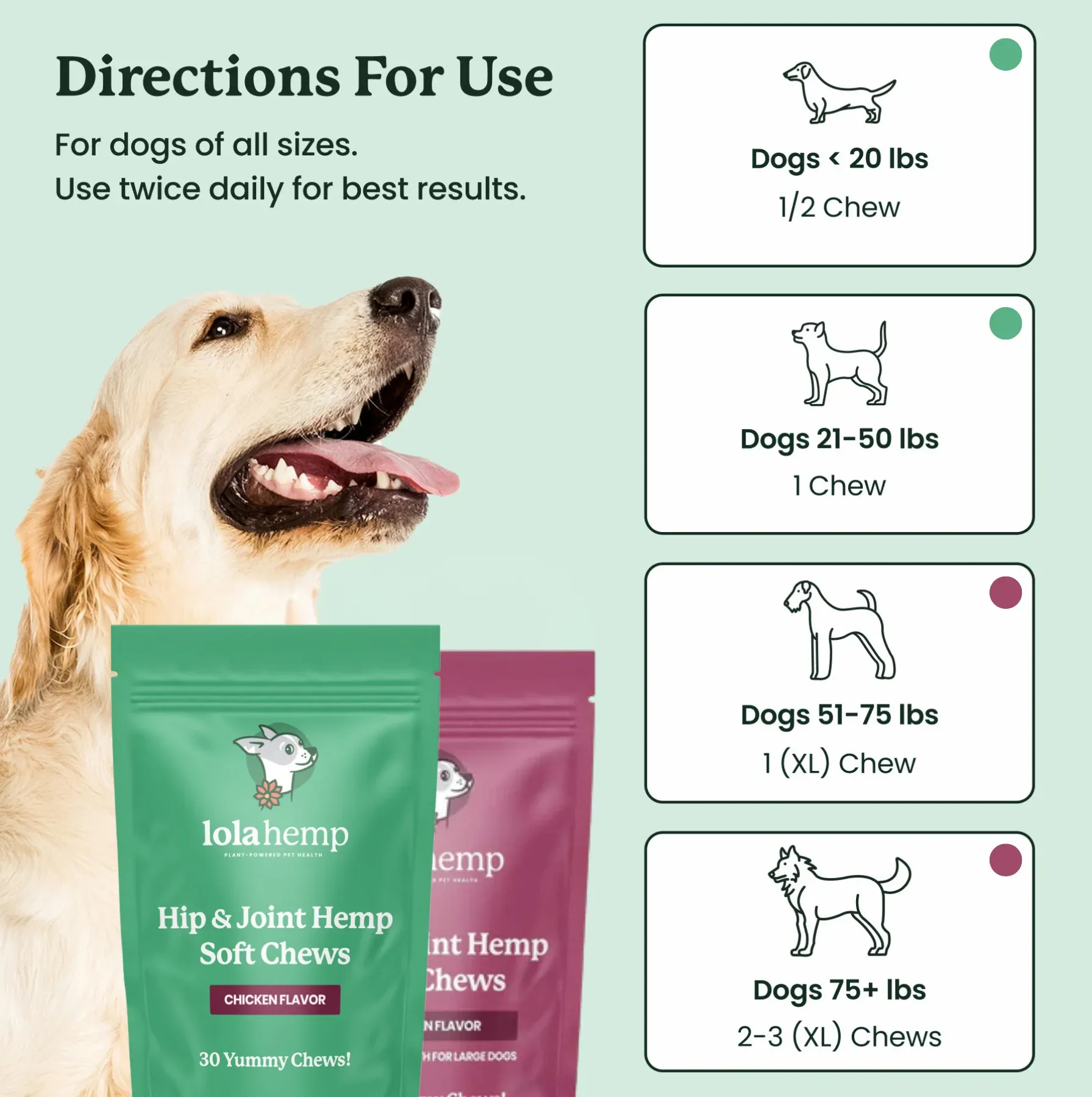 This image lists the directions for use of Lolahemp
This image lists the directions for use of Lolahemp
